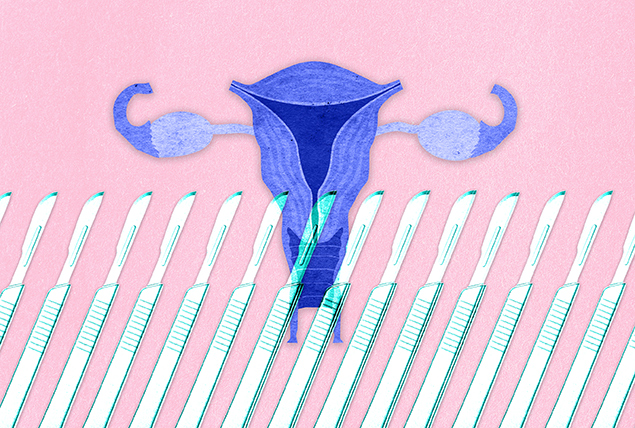Fallopian Tube Removal Advised to Prevent Ovarian Cancer, Experts Say

Editor's Note: This story has been updated to more accurately reflect previous recommendations.
The world's largest nonprofit group dedicated to ovarian cancer, the Ovarian Cancer Research Alliance (OCRA), recently announced a major change in its messaging.
The group recently announced a change in direction, citing a study of more than 200,000 women that showed current screening techniques and straightforward symptom detection don't save lives.
"This replaces years of focus on symptom awareness and early detection, after a rigorous clinical trial in the United Kingdom that followed more than 200,000 women for more than 20 years revealed sobering and deeply disappointing news," OCRA stated in a Feb. 1 press release, "...that current screening methods do not impact mortality in average-risk women. Put more simply, the trial showed screening and symptom awareness will not save lives."
Ovarian cancer, the second-most common gynecological cancer, is expected to cause about 13,270 deaths and 19,710 new diagnoses in 2023, according to American Cancer Society estimates.
"Scientists are still trying to determine why, but regardless of the stage at diagnosis, some ovarian cancers are deadlier than others," OCRA said in a Jan. 30 statement. "In many cases, the stage at diagnosis may not significantly impact whether a patient dies from the disease. Detecting ovarian cancer earlier in the course of its disease progression—which could be at an earlier stage—may not prevent a woman from dying."
Any person with ovaries is at risk of contracting ovarian cancer. Those with a family history of ovarian cancer have a much higher chance of getting the illness.
As part of the initiative, OCRA began a pilot program on Feb. 1 that provides qualified individuals at increased risk with free, at-home genetic testing.
Symptoms of ovarian cancer
Ovarian cancer often develops without signs or symptoms to alert its host. By the time a woman experiences ovarian cancer symptoms, unfortunately, the cancer likely has progressed to a deadly stage.
Signs you should see a doctor as soon as possible include the following:
- Abnormal vaginal bleeding, particularly among menopausal women
- Pain or pressure in the pelvic area
- Abdominal or back pain
- Bloating
- Feeling full or difficulty eating
- Changes in bathroom habits, including constipation or frequent urination
Surgery to remove your fallopian tubes
Women who are past childbearing age or have decided to not have children may want to consider fallopian tube removal as a means to prevent ovarian cancer, experts advise.
The surgery to remove fallopian tubes, known as an opportunistic salpingectomy, is suggested for women already undergoing pelvic surgery for a hysterectomy, tubal ligation, cyst or endometriosis, according to the OCRA statement. A salpingectomy to remove the fallopian tubes leaves the ovaries intact, possibly decreasing the chances of surgical menopause.
"As the fallopian tube is the origin of most high-grade serous cancers, fallopian tube removal has been shown to dramatically reduce risk for a later ovarian cancer diagnosis," the OCRA statement read.
The nonprofit group's advice was based on the findings of the clinical trial of 202,562 women recruited between 2001 and 2005. They were ages 50 to 74, living in Northern Ireland, Wales and England, and had no previous or family history of ovarian cancer.
The trial found the most common outcome among the participants was death due to ovarian or tubal cancer, regardless of whether the woman had annual multimodal screenings, annual transvaginal ultrasound screenings or no annual screening at all.
With this major finding in mind, OCRA said more needs to be done to improve early ovarian cancer detection.
"It is clear that for early detection to dramatically improve outcomes, new yet undiscovered methods will need to be developed so the cancer can be discovered much earlier for those with the more aggressive ovarian cancer," OCRA's statement said. "How much earlier is unknown, though researchers have hypothesized it could be as much as five years or more to increase life expectancy. The technology for this does not currently exist [or hasn't been recognized as such], and once it does, it will need to be evaluated in a large, randomized trial which will take many years."
OCRA isn't alone in suggesting women remove their fallopian tubes. The Society of Gynecologic Oncology endorsed OCRA's recommendation, according to the alliance. In 2013, the society published similar guidance suggesting optional salpingectomies could save women from some of the more deadly forms of ovarian cancer.
"While devastating news for our community, which for so long focused on symptom awareness, it's essential that we not ignore these findings," OCRA stated. "We must focus our energy on what we know really does work, and effect real change by acting on what we know can save lives."
The following are OCRA's new recommendations:
- Encouraging women, or anyone born with ovaries, to know their risk.
- Promoting genetic testing to at-risk populations, engaging in the consideration of population-based genetic testing, and taking action when necessary is more beneficial—a sure way to decrease incidence and mortality.
- Encouraging people who are undergoing pelvic surgeries for benign conditions (hysterectomy, tubal ligations, cysts, endometriosis) to consider having their fallopian tubes removed.
- Educating about the symptoms of ovarian cancer, so patients may receive a prompt diagnosis, which may ease psychological distress and facilitate treatment.
- Educating to ensure every person diagnosed with ovarian cancer is seen by a gynecologic oncologist and has access to the best standard of care.
- Educating patients to utilize genomic testing for more personalized treatment.
- Encouraging cascade testing for patients' family members when a mutation that increases ovarian risk is discovered.
- Promote consideration of participation in clinical trials.


















